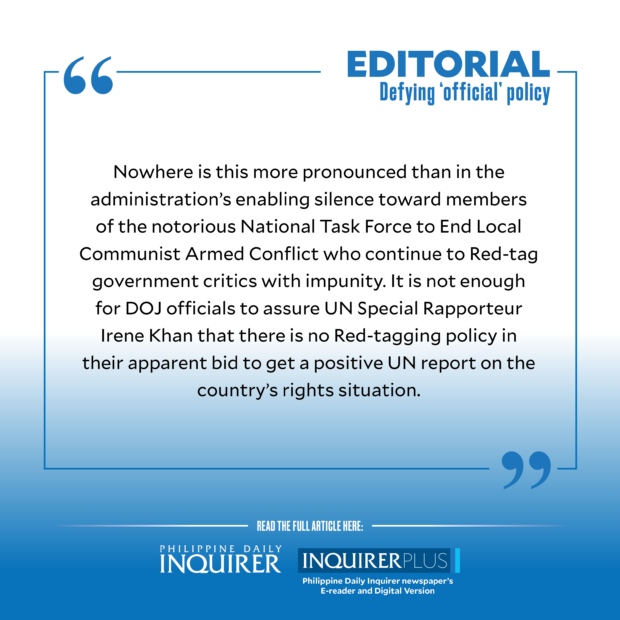Defying ‘official’ policy

With the United Nations (UN) Special Rapporteur Irene Khan visiting the country to assess its state of press freedom and freedom of speech, one would expect Philippine officials to be on their best behavior to prove the government’s assertion that democracy is “flourishing” and that human rights prevail in the country.
Unfortunately, a key official who should have been at the forefront of showcasing the improved rights situation under the new administration chose to engage in mindless Red-tagging that targeted a journalist, thus continuing an abhorrent practice employed by the previous administration.
Paul Gutierrez, executive director of the Presidential Task Force on Media Security described Tacloban-based community journalist Frenchie Mae Cumpio of the alternative news outfit Eastern Vista, as being detained at the Palo provincial jail in Leyte “for her active role in the local terrorist groups of communists.”
Cumpio and four others were arrested on Feb. 7, 2020, at the newspaper’s staff house that the military had alleged was a communist safe house. The five have denied the charges.
Enemies of the state
Gutierrez Red-tagged Cumpio after noting that Khan was keen to learn about her case, prompting the National Union of Journalists of the Philippines to point out the “absurdity of having a body created for media security, in a government task force that actively puts journalists’ security at risk by accusing them of being enemies of the state.”
Ironically, Gutierrez said Khan’s visit was an opportunity to “showcase the nation’s commitment to openness, transparency, and its vibrant media community highlighted by everyone’s right to freely express their opinion.”
Khan had directly asked Department of Justice (DOJ) officials if Red-tagging was official policy, and got a reassuring response. “We said it is not a policy,” DOJ Undersecretary Raul Vasquez recalled telling the UN rapporteur. DOJ officials also assured Khan that victims of Red-tagging are encouraged to file a complaint, and that the government would pursue cases against state agents and others engaged in the act.
The two instances aptly illustrate the disconnect between the government’s avowed policy to do away with Red-tagging, and the actions of its officials who have adopted the previous administration’s hostile attitude toward journalists, militants, and other groups deemed critical of government.
Most dangerous countries
Nowhere is this more pronounced than in the administration’s enabling silence toward members of the notorious National Task Force to End Local Communist Armed Conflict who continue to Red-tag government critics with impunity.
It is not enough for DOJ officials to assure Khan that there is no Red-tagging policy in their apparent bid to get a positive UN report on the country’s rights situation. President Marcos himself must explicitly disavow Red-tagging as a policy and order his entire administration to follow this official position, while sanctioning those who willfully defy it. Key officials tasked with promoting respect for rights and freedoms, such as Gutierrez, must be compelled to toe the line and adhere to official policy.
Apart from doing away with Red-tagging, the government should also push for the resolution of long-pending cases that involve the killing of journalists, lawyers, and human rights defenders, and bring the perpetrators to justice. That the suspects behind the killing of broadcast journalists Percival “Percy Lapid” Mabasa on Oct. 3, 2022, and Juan Jumalon on Nov. 5, 2023, remain scot-free confirms the Philippines’ reputation as one of the most dangerous countries for journalists and defenders of press freedom.
Expansion of democratic space
It is this notoriety that has led to Khan’s 10-day visit, as she holds discussions with various government agencies and civil society organizations for her report to the 59th session of the UN Human Rights Council in June next year.
Clearly, the country is still reeling from the damning UN report in 2020 which noted the “widespread human rights violations and persistent impunity” under the presidency of Rodrigo Duterte, whose brutal war against illegal drugs resulted in the killing of at least 6,000, but as many as 30,000, suspects during police raids.
In the 2020 report, the UN human rights office noted how a “heavy-handed focus” on illegal drugs and “harmful rhetoric from high-level officials” led to killings and human rights violations. It also reported that Red-tagging “posed a serious threat to civil society and freedom of expression,” with some of those tagged ending up being arrested, detained, or killed.
It can be argued that the situation has significantly improved, with the current administration adopting a rehabilitative, rather than a punitive, approach. But clearly, a lot still needs to be done to ensure the protection of human rights and the expansion of democratic space to allow freedom to flourish. Finally ending the practice of Red-tagging is one key reform to achieve that goal.
















